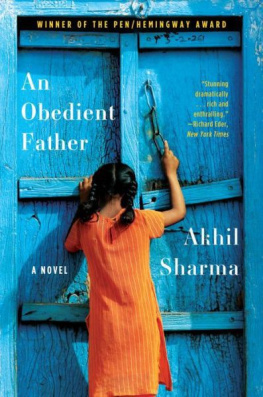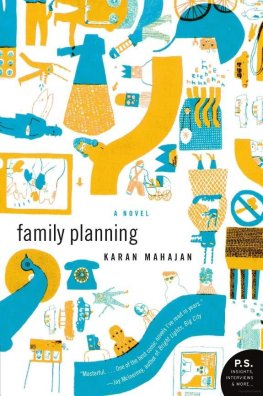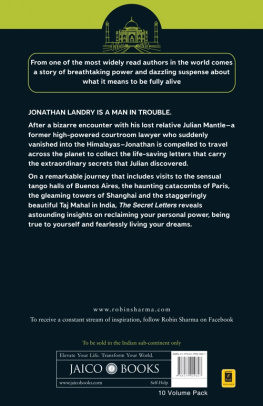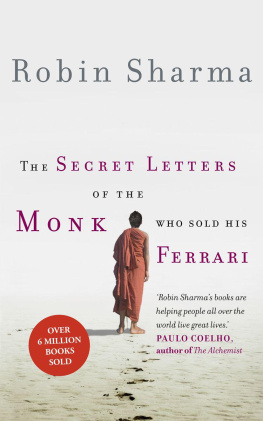ONE
I needed to force money from Father Joseph, and it made me nervous. He had bribed me once before, for a building permit, soon after he became principal of Rosary School. Also, he had admitted my granddaughter, Asha, into his school without our having to make the enormous donation usually required. But Father Joseph was strange and unpredictable.
Several months ago, his school, in a posh part of Old Delhi, had given a dinner party to introduce him. Because of my work for the Delhi municipal education department, I was invited. During the party Father Joseph demonstrated his expertise in karate. The party was in the school's front field. A steel pole had been cemented upright several meters from the buffet tables. Father Joseph, short, and heavy with muscle, wearing the white robe of a karate teacher, beat at the pole for half an hour with his bare feet and fists while forty or fifty people watched and ate. Sometimes he would step a few feet from the pole and groan at it. Near the end of his demonstration, he became so tired that there were pauses as long as a minute between blows. Because this was so odd, and because Father Joseph had spoken to me in English when the party started, at first I thought the display might be an example of a foreign affectation. After he was done, still dressed in the robe. Father Joseph spent the rest of the night meeting his guests. He kept clenching and unclenching his hands from soreness.
It was morning. The sky was a single blue from edge to edge. I had just bathed and was on my balcony hanging a towel over the ledge. The May heat was so intense that as soon as I stepped out of the flat, worms of sweat appeared on my bald scalp. In the squatter colony behind our compound several women crouched before their huts, cooking breakfast on kerosene stoves. Two men wearing only shorts and rubber slippers stood next to a hand pump, soaping their bodies. On the roof of a nearby building, a woman was bathing her daughter with a tin bucket and a bowl. The naked girl, perhaps seven or eight years old, kept slipping out of her mother's grasp and running about the roof
I had been Mr. Gupta's moneyman for a little less than a year and was no good. It did not take me long to realize this, and once I did, unwilling to give up the increased pay, I tried to delight in having achieved a position that exceeded my ability. I enjoyed believing that I had tricked Mr. Gupta into giving me a place near all the illegal money that poured through the education department. This pleased me so much that I pictured myself weeping in the middle of negotiations with some school principal and calling myself a "whore" while I kept a hand over my heart. But on the mornings before bribe collections, these fantasies came involuntarily. Now, instead of making me laugh, they made me feel threatened, as if I were crazy and out of control.
The principals I extorted were better educated than I was and generally far more competent and responsible. I had never graduated from higher secondary, and my job as a junior officer in the physical education department officially involved little more than counting cricket bats and badminton rackets and making sure that 4 percent of a school's land was used for physical education.
My panic in negotiations was so apparent that even people who were eager to bribe me became resentful. At the meals they were custom-bound to serve with the bribe, they joked about my weight. "You're as good as two men," they might say as I piled food on my plate, or would remark, "Have you been fasting?" With principals who appeared even more uncertain than I was, I sometimes grew angry to the point of incoherence. Occasionallybecause of my heart attack seven months earlier and the medicines I now tookas I talked with them, I got tired, confused, and sleepy.
My general incompetence and laziness at work had been apparent for so long that I now think it was arrogant of Mr. Gupta to pick me as his moneyman. I am the type of person who does not make sure that a file includes all the pages it must have or that the pages are in the right order. I refuse to accept even properly placed blame, lying outright that somebody else had misplaced the completed forms or spilled tea on them, even though I was the last one to sign them out or had the soggy papers still on my desk. All this is common for a certain type of civil servant who knows that he is viewed with disdain by his superiors and that he cannot lose his job. My predecessor as moneyman, Mr. Bajwa, used to lie even about what he had brought for lunch. He would rather eat on the office roof than not lie. Mr. Bajwa, however, had incredible energy He also had a compulsion to court everyone who came near him. Many times he had told me that I was one of his best friends, even though it was apparent that he did not like me.
He had to be replaced because, when V P. Singh defeated Rajiv Gandhi and became Prime Minister in the last elections, the Central Bureau of Investigation wanted to show its loyalty to the new rulers by attacking the Congress Party and its supporters. They brought corruption charges against Mr. Bajwa. Since then, Rajiv Gandhi had forced out V P. Singh and put Rajiv's pawn Chandrashekar in power. And the upcoming elections might make Rajiv Gandhi Prime Minister again.
When the mother finished bathing her daughter, I went inside.
The last twelve months had been long and sorrowful. They began with my wife, Radha, finally dying of cancer. A few months later, I had a heart attack that woke me in the middle of the night screeching, "My heart is breaking," so loudly that my neighbors kicked open the door of the flat to see what was happening. More recently, my son-in-law Rajinder had died when his scooter slipped from beneath him on an oil slick. And then Anita, my daughter, and eight-year-old Asha had come to live with me, bringing with them a sadness so apparent that sometimes I had to look away.
Asha was asleep on my cot with one knee pulled up to her stomach. My room is a windowless narrow rectangle, and the little light from the balcony and kitchen, funneled through the common room behind me, was a handkerchief on her face. Asha sometimes fell asleep on my cot while she waited for me to leave the bathroom. I knelt beside the cot to wake her gently Her eyelids were trembling.
When Rajinder was alive and Anita used to bring Asha with her on visits, I would ask Asha how school was and offer her round orange-flavored toffees that, despite her laughing denials, I claimed grew on a small tree in a cupboard. Nothing else was expected from me. Since they had moved in two months ago, misery as intense as terror had drained all the fat from Asha's body, making her teeth appear larger than they were and her fingers impossibly long. This made me try to say more, but when I asked her about herself, I felt false and intrusive.
As I kept looking at Asha, I noticed it was possible to see her as pretty Her face was almost square and her hair chopped short like a boy's, but there was something both strong and vulnerable about her. She had long eyelashes and a mouth that was too large for her face and hinted at an adult personality. I wondered whether I was
finding beauty in Asha because her youth was a distraction from my own worries, like turning to a happy memory during distress. I put a hand on Asha's knee. It was the size of an egg and its delicacy made me conscious of her lighter-than-air youth and of my enormous body pressing down on my scarred heart.
In the squatter colony a hand pump creaked and someone made clucking sounds as a horse stomped. I heard Anita's sari sighing as she moved about the kitchen. The municipality gave our neighborhood water in the morning for only three hours. "Wake up," I said. "The water will go soon."
Asha stepped out of the bathroom into the common room.













